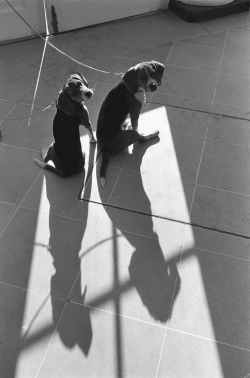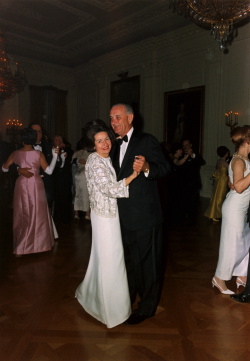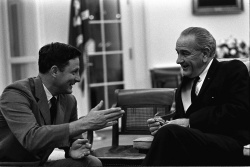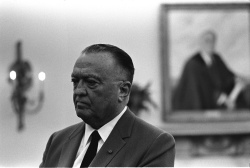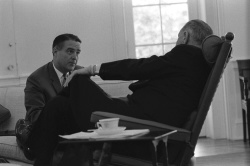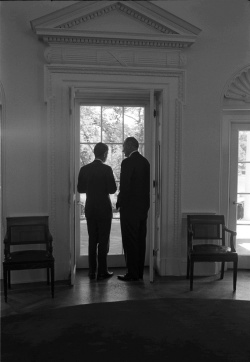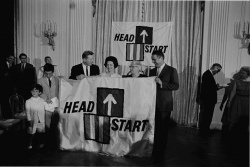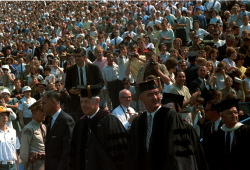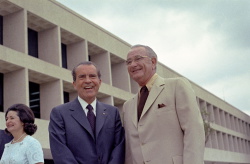1st2nd3rd4th5th6th7th8th9th10th11th12th13th14th15th16th17th18th19th20th21st22nd23rd24th25th26th27th28th29th30th31st
May 1st
On this day in 1962, Vice-President Lyndon Johnson helped dedicate the Eisenhower Library in Abilene, Kansas.
On this day in 1965, President Johnson made a statement on the new speed records set by the United States Air Force.
“I have just been informed this afternoon that the United States Air Force has today claimed new world records for aircraft speed on a straight course of over 2,000 miles per hour and on a closed course of 1,688 miles per hour.
“The record for a straight course flight was set by a YF-12A aircraft on a flight made today at Edwards Air Force Base, California, with a crew consisting of Colonel Robert L. Stephens and Lieutenant Colonel Daniel Andre.
…
“This aircraft and its performance stand as a remarkable and impressive tribute to the genius, initiative, and leadership of American science and technology and to all who have participated in its conception and development. Particular praise is due the designer, Mr. Kelly Johnson, whose imaginative and creative talent has done so much to maintain and advance our Nation’s leadership in the aeronautical field.”
May 2nd
On this day in 1965, President Johnson gave a radio and television report to the American people on the situation in the Dominican Republic.
“Earlier today I ordered two additional battalions—2,000 extra men—to proceed immediately to the Dominican Republic. In the meeting that I just concluded with the congressional leaders— following that meeting I directed the Secretary of Defense and the Chairman of the Joint Chiefs of Staff to issue instructions to land an additional 4,500 men at the earliest possible moment. The distribution of food to people who have not eaten for days, the need of medical supplies and attention for the sick and wounded, the health requirements to avoid an epidemic because there are hundreds that have been dead for days that are now in the streets, and that further protection of the security of each individual that is caught on that island require the attention of the additional forces which I have ordered to proceed to the Dominican Republic.
“In addition, our servicemen have already, since they landed on Wednesday night, evacuated 3,000 persons from 30 countries in the world from this little island. But more than 5,000 people, 1,500 of whom are Americans—the others are foreign nationals—are tonight awaiting evacuation as I speak. We just must get on with that job immediately.
“The American nations cannot, must not, and will not permit the establishment of another Communist government in the Western Hemisphere. This was the unanimous view of all the American nations when, in January 1962, they declared, and I quote: ‘The principles of communism are incompatible with the principles of the inter-American system.’
“This is what our beloved President John F. Kennedy meant when, less than a week before his death, he told us: ‘We in this hemisphere must also use every resource at our command to prevent the establishment of another Cuba in this hemisphere.’
“This is and this will be the common action and the common purpose of the democratic forces of the hemisphere. For the danger is also a common danger, and the principles are common principles.
“So we have acted to summon the resources of this entire hemisphere to this task. We have sent, on my instructions night before last, special emissaries such as Ambassador Moscoso of Puerto Rico, our very able Ambassador Averell Harriman, and others to Latin America to explain the situation, to tell them the truth, and to warn them that joint action is necessary. We are in contact with such distinguished Latin American statesmen as Romulo Betancourt and Jose Figueres. We are seeking their wisdom and their counsel and their advice. We have also maintained communication with President Bosch, who has chosen to remain in Puerto Rico.
“We have been consulting with the Organization of American States, and our distinguished Ambassador, than whom there is no better, Ambassador Bunker, has been reporting to them at great length all the actions of this Government and we have been acting in conformity with their decisions.”
On this day in 1965, President Johnson had a telephone conversation with W. Tapley Bennett, the American Ambassador to the Dominican Republic.
The two men discussed the continued violence in the Dominican Republic; the OAS delegation; Jose Mora’s meetings; and problems with communications. President Johnson stressed the importance of press coverage. They also discussed the status of evacuation; casualties; OAS approval of a military link-up; and a possible meeting with Juan Bosch.
On this day in 1964, President Johnson had a telephone conversation with Vice-President Hubert Humphrey.
May 3rd
On this day in 1941, a rally was held opening Lyndon B. Johnson’s 1941 U.S. Senate Campaign in San Marcos, Texas.
On this day in 1968, President Johnson made Remarks at the Dedication of the Smithsonian Institution’s National Collection of Fine Arts.
“If I will never be remembered as a patron of the arts, I should be delighted to be known as an uncle of the arts.
“Truly, this is a historic night for all of us. Until now, the United States was the only great country which had no national museum devoted to its own art.
“The American collection was shunted about our Capital like a cultural stepchild. It was always in search of a home. Tonight it has a home—a great, historic home whose sandstone came from quarries that were first operated by George Washington, and whose halls welcomed Abraham Lincoln on the night of his Inaugural Ball.
“So tonight, thanks to the tireless dedication of many, many Americans, we see laid out before us the creative history of our great Nation.”
May 4th
On this day in 1965, President Johnson had a telephone conversation with Clarence Mitchell, representative of the NAACP.
The two men talked about the poll tax amendment to the Voting Rights Bill and the President’s support for a ban on the poll tax; and his voting record on the poll tax; lowering the voting age to 18; Attorney General Nicholas Katzenbach’s concerns about the constitutionality of the voting rights bill; and the appointments of Samuel Jackson, Marjorie Lawson, and Patricia Harris.
On this day in 1966, President Johnson held a reception at the White House for members of the Diplomatic Corps.
On this day in 1965, President Johnson sent a special message to the Congress Requesting Addition Appropriations for Military Needs in Vietnam. On May 7, the President approved a joint resolution making available to the Department of Defense a supplemental appropriation of $700 million.
“Our conclusions are plain.
“We will not surrender.
“We do not wish to enlarge the conflict.
“We desire peaceful settlement and talks.
“And the aggression continues.
“Therefore, I see no choice but to continue the course we are on, filled as it is with peril and uncertainty.
“I believe the American people support that course. They have learned the great lesson of this generation: wherever we have stood firm aggression has been halted, peace restored, and liberty maintained.
“This was true in Iran, in Greece and Turkey, and in Korea.
“It was true in the Formosa straits and in Lebanon.
“It was true at the Cuban missile crisis.
“It will be true again in southeast Asia.
“Our people do not flinch from sacrifice or risk when the cause of freedom demands it, and they have the deep, abiding, true instinct of the American people: when our nation is challenged it must respond. When freedom is in danger, we must stand up to that danger. When we are attacked, we must fight.
“I know the Congress shares these beliefs of the people they represent.
“I do not ask complete approval for every phrase and action of your government. I do ask for prompt support of our basic course: resistance to aggression, moderation in the use of power, and a constant search for peace. Nothing will do more to strengthen your country in the world than the proof of national unity which an overwhelming vote for this appropriation will clearly show. To deny and delay this means to deny and to delay the fullest support of the American people and the American Congress to those brave men who are risking their lives for freedom in Viet-Nam.”
May 5th
On this day in 1965, President Johnson had a conversation with Texas Congressman George Mahon that was recorded in the Oval Office.
President Johnson lobbied Mahon for passage of a supplemental military appropriations bill saying it would show congressional support for Vietnam policy. Mahon expressed concerns about terrorism. President Johnson defended U.S. action in the Dominican Republic and the OAS role there. The two men discussed enemy casualties in Vietnam.
On this day in 1965, President Johnson made Remarks Upon Presenting a Social Security Check to the 20-Millionth Beneficiary (William J. Kappel.)
“In this country we all believe that every man wants dignity and a decent life and not a dole. We believe that every man wants a fair chance and not charity. We believe that older Americans have earned and deserve peace of mind, not pain and panic, when misfortune strikes.
“The social security system, and the historic legislation that is now pending in the Senate, are our testaments to those beliefs.
“So, Mr. Kappel, it gives me a great deal of pleasure to meet with you today and to present to you, the 20-millionth recipient of social security benefits, your first social security check.”
May 6th
On this day in 1964, President Johnson, along with Attorney General Robert F. Kennedy, presented the Young American Medals in the Rose Garden of the White House.
“They are here as representatives of the many young Americans who perform great deeds of courage and important acts of service to their friends and to their communities. You know, we hear and read so much about delinquency that I know that all of us find special enjoyment in seeing these young people and hearing the Attorney General tell us of their outstanding deeds of heroism and bravery.”
May 7th
On this day in 1965, President Johnson signed a resolution appropriating funds for military requirements in Viet-Nam.
“It is not the money but it is the message that matters, and that message is simple. I think that message is honest and clear: we will do whatever must be done to insure the safety of South Viet-Nam from aggression. We will use our power with restraint, and we will use it with all the wisdom that we can command. But we will use it.”
On this day in 1965, President Johnson had a telephone conversation with Senator Birch Bayh.
The two men discussed Senator Edward Kennedy’s poll tax amendment to the Voting Rights Bill; Senator Robert Kennedy’s lobbying tactics; certain constitutional questions; Nicholas Katzenbach’s concern that the Kennedy amendment would jeopardize the bill; Robert Kennedy’s request that Katzenbach be appointed Attorney General; and the future of the Democratic Party.
May 8th
On this day in 1964, from Atlanta, Georgia, President Johnson addressed the public on live television and radio. That afternoon, he went to the Rose Garden to participate and speak during the ceremony honoring J. Edgar Hoover’s 40th anniversary as Director of the Federal Bureau of Investigation. He signed Executive Order 11154 “Exemption of J. Edgar Hoover From Compulsory Retirement For Age.” That night, LBJ attended a private birthday party for former President Harry S. Truman.
On this day in 1968, President Johnson met with Field Marshal Thanom Kittikachom, Thailand.
May 9th
On this day in 1967, President Johnson made Remarks at the Democratic Congressional Dinner.
“I am glad to see so many unarmed Democrats in one meeting tonight.
“There may even be a couple of Republicans here. I notice you are charging Republican prices.
“But there couldn't be many more than a couple, because I see so many familiar Democratic faces—all of them members of our quiet, orderly, completely unified Democratic Party.
“As the Duke of Wellington once said, ‘If you can believe that, you can believe anything.’
“But if the description seems incredible—there’s that word again—the pleasure of this evening is self-evident. We Democrats like to be together, and we like to fight. We always start by fighting each other. That gets us ready—it says here—to take on the other party.
“Judging by the results over the past 35 years, I think that you will have to conclude that that is a pretty good system—though it can be a little strenuous at times.
“I don’t intend to get too serious in an after-dinner atmosphere. ‘Larry O’Brien’s Law’ states that the more expensive the meal, the less expansive the speakers.
“But I think it is vital—at a time when many are harping on the alleged disunity of our party—to reemphasize some of the things we have in common as Democrats.
…
“There is creative work to be done by the 90th Congress, as well as laws to be written, laws that will:
“—give us stronger tools to control air pollution,
“—make our streets safer, and our criminal justice system fairer and more effective,
“—provide greater economic security for millions of older Americans,
“—and strengthen our efforts to secure the rights of all Americans.
“These proposals represent my notion of what is needed now—if we are to meet the needs of the people of America now. I welcome your ideas; I welcome your innovations and your responses to those needs. Many of the greatest achievements of the 89th Congress were not written at the western end of Pennsylvania Avenue. The same can and should be true of the 90th Congress."
On this day in 1967, President Johnson met with Vice President C. K. Yen, Republic of China.
On this day in 1964, President Johnson addressed the audience at the Dedication of the John F. Kennedy Cultural Center. He unveiled the plaque for the JFK Cultural Center in Nassau County, New York.
On this day in 1968, President Johnson met with Prime Minister Seewoosagur Ramgoolam, Mauritius.
May 10th
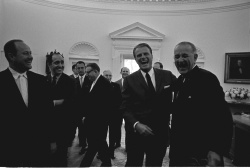 President Lyndon B. Johnson presents Billy Graham with the Big Brothers of America Award
President Lyndon B. Johnson presents Billy Graham with the Big Brothers of America Awardcredit: Yoichi Okamoto
On this day in 1966, President Johnson made Remarks Upon Presenting the Big Brother of the Year Award to the Reverend Billy Graham.
“Dr. Graham, when they told me you were going to receive the Big Brother of the Year Award, I recalled some lines from a hymn that I used to sing as a boy. I believe they are appropriate for the occasion today:
“‘Throw out the life-line across the dark wave; there is a brother whom someone should save…’
“I’m not going to ask you to sing it, but I’m sure you remember the rest of the words.
“Few men have thrown out as many lifelines as Billy Graham. They are lifelines of hope, of faith, of guidance, and of spiritual strength. Today, one of those lifelines is coming back—with a word of thanks from a group of very dedicated Americans.
“The Good Book tells us that, ‘Whatsoever a man soweth, that shall he also reap.’ In your case, Dr. Graham, it is a rich harvest of satisfaction—and gratitude.
“Big Brothers of America are honoring you today for your leadership and influence among the youth of our Nation. I know something about that leadership—and I have seen some of the results of that influence. It is no small thing.
“A man’s character is molded in his youth, or, as Wordsworth once wrote, ‘The child is father of the man.’
“I do not despair of our youth. I think our young men and women in the Peace Corps, in Vietnam, and in our community action poverty programs, have established themselves as the finest generation in the history of this Nation, but it’s reassuring to know there are great men like you who have helped so many of them along the early part of their journey.”
On this day in 1967, President Johnson made a statement on the Proposed International Center for Advanced Study in the Health Sciences.
“The basic objective of the Center will be to advance medical research and knowledge worldwide. When fully operative, the Center will enable 30 distinguished scholars at a time to spend periods of one to two years of work at the Institutes concentrating on important areas of progress in health.
“In addition to a continuing program of international conferences and seminars, two special fellowship programs would operate through the Center: one, professorships supporting the international exchange of outstanding teachers and health scientists; two, grants supporting the training of promising foreign scientists in U.S. laboratories, health agencies, and universities.”
May 11th
On this day in 1937, LBJ met President Franklin D. Roosevelt in Galveston, Texas, and rode on the presidential train with FDR and his entourage.
On this day in 1966, President Johnson made Remarks at the Woodrow Wilson School for Public and International Affairs, Princeton University. The President was awarded an honorary degree of Doctor of Laws.
“As I look upon America this morning from the platform of one of her greatest universities, I see, instead, a nation whose might is not her master but her servant.
“I see a nation conscious of lessons so recently learned:
“That security and aggression, as well as peace and war, must be the concerns of her foreign policy.
“That a great power influences the world just as surely when it withdraws its strength, as when it exercises its strength.
“That aggression must be deterred where possible and met early when undertaken.
“That the application of military force, when it becomes necessary, must be for limited purposes and must be tightly controlled.
“Surely it is not a paranoid vision of America’s place in the world to recognize that freedom is still indivisible—still has adversaries whose challenge must be answered.
THE STERNEST CHALLENGE
“Today, of course, as we meet here, that challenge is sternest—at the moment—in Southeast Asia. Yet there, as elsewhere, our great power is also tempered by great restraint. What nation has announced such limited objectives or such willingness to remove its military presence once those objectives are secured and achieved? What nation has spent the lives of its sons and vast sums of its fortune to provide the people of a small, striving country the chance to elect a course that we might not ourselves choose?
The aims for which we struggle are aims which, in the ordinary course of affairs, men of the intellectual world applaud and serve: the principle of choice over coercion, the defense of the weak against the strong and the aggressive, the right of a young and frail nation to develop free from the interference of her neighbors, the ability of a people—however inexperienced, however different, however diverse—to fashion a society consistent with their own traditions and values and aspirations.
THE SCHOLAR'S OBLIGATION
“These are all at stake in that conflict. It is the consequences of the cost of their abandonment that men of learning must examine dispassionately. For, I would remind you, to wear the scholar’s gown is to assume an obligation to seek truth without prejudice and without cliché, even when the results of the search sometimes are at variance with one’s own predilections and own opinions.
“That is all we expect of those who are troubled—even as we are—by the obligations of power the United States did not seek but from which the United States cannot escape.
“It was twenty-six years ago that Archibald MacLeish asked of all scholars and writers and students of his generation what history would say of those who failed to oppose the forces of disorder then at loose in Europe.
“We must ask of this generation the same question concerning Asia.
“MacLeish reminded that generation of the answer that was given by Leonardo when Michelangelo indicted him for indifference to the misfortunes of the Florentines. ‘Indeed,’ said Leonardo, ‘indeed, the study of beauty has occupied my whole heart.’
“Other studies, no matter how important, must not now detract the man of learning from the misfortunes of freedom in Southeast Asia.
“While men may talk of the ‘search for peace’ and the ‘pursuit of peace,’ we really know that peace is not something to be discovered suddenly—it is not a thing to be caught and contained. Because peace must be built—step by painful, patient step, and the building will take the best work of the world’s best men and women.
“It will take men whose cause is not the cause of one nation but whose cause is the cause of all nations—men whose enemies are not other men but the historic foes of mankind. I hope that many of you will serve in this public service for the world.
“Woodrow Wilson knew that learning is essential to the leadership that our world so desperately yearns for and needs today. Before he came to Princeton, he attended a small college in North Carolina and went to classes every day beneath a portal which bore the Latin inscription, ‘Let learning be cherished where liberty has arisen.’
“Today, this motto which served a President must also serve all mankind. Where liberty has arisen, learning must be cherished—or liberty itself becomes a very fragile thing.
“So we dedicate this building today—not only to the man; not only to the Nation’s service—but to learning in the service of all mankind.
“There can be no higher mission.”
On this day in 1964, President Johnson made remarks to the Ambassadors of Nations participating in the Alliance for Progress.
“I said last November, ‘Let us make the Alliance for Progress President Kennedy’s living memorial.’
“Today’s agreements are part of our pledge. The United States will provide almost $40 million—the countries of Latin America will provide $60 million—for projects that we are beginning in 14 countries. These projects will help eliminate malaria in Brazil. They will help train farmers in Bolivia. They will establish for the first time three rural electric cooperatives serving 10,000 homes and farms in the countryside of Colombia. They will bring credit and assistance to 21,000 small farms in the land reform and colonization areas of Peru. They will touch the lives and ease the struggles of 23 million people across our hemisphere.
“These are only the latest steps in six months of very extraordinary effort since I became President. Since last December, the United States has extended more than $430 million in assistance.”
At the close of his formal remarks, the President signed 12 new Alliance for Progress loan agreements extending $40 million in credits including $10 million for the Central American Bank for Economic Integration.
On this day in 1964, President Johnson made remarks to the Ambassadors of Nations participating in the Alliance for Progress.
“I said last November, ‘Let us make the Alliance for Progress President Kennedy’s living memorial.’
“Today’s agreements are part of our pledge. The United States will provide almost $40 million—the countries of Latin America will provide $60 million—for projects that we are beginning in 14 countries. These projects will help eliminate malaria in Brazil. They will help train farmers in Bolivia. They will establish for the first time three rural electric cooperatives serving 10,000 homes and farms in the countryside of Colombia. They will bring credit and assistance to 21,000 small farms in the land reform and colonization areas of Peru. They will touch the lives and ease the struggles of 23 million people across our hemisphere.
“These are only the latest steps in six months of very extraordinary effort since I became President. Since last December, the United States has extended more than $430 million in assistance.”
At the close of his formal remarks, the President signed 12 new Alliance for Progress loan agreements extending $40 million in credits including $10 million for the Central American Bank for Economic Integration.
May 12th
On this day in 1965, President Johnson had a telephone conversation with Adlai Stevenson, U.S. Ambassador to the United Nations.
President Johnson asked Stevenson to talk in confidence to U Thant, Secretary-General of the UN, about a Vietnam bombing pause contingent upon the cessation of infiltration; LBJ had doubts about the effectiveness of a pause. The men discussed possible domestic and congressional reaction to the pause and a call for a ceasefire by U Thant or Pope Paul.
On this day in 1964, President Johnson made remarks at a meeting of the President’s Committee on Equal Employment Opportunity.
“Now, for 60 days up there, we have been discussing the details of the civil rights bill, an equal rights bill, a constitutional rights bill. The net effect of that bill will be to take these problems out of the streets and the back alleys and bring them into the courts to let them be judiciously determined and handled.
“That bill must be passed. That kind of legislation must become the law of the land. We cannot see our democratic system spend 60 days on a bill like that and then fail.
“But it is going to fail unless the people, in righteous indignation, let them know that they do not have that superior feeling and they do require legislation that protects a person because of his particular color. If the Congress does not act on that legislation, we will have some very dark days in this country.
“I think that you have set an example in the employment field, but you just have been able to set an example, and that is all. You haven’t skimmed the surface. You have covered roughly one-tenth of the jobs in the country by your Plans for Progress program. There are 70 million working, and you have 7 million of them covered.”
May 13th
On this day in 1937, LBJ was sworn in as U.S. Representative for the 10th Congressional District of Texas.
On this day in 1965, President Johnson addressed members of the Association of American Editorial Cartoonists: The Challenge of Human Need in Viet-Nam.
On this day in 1964, President Johnson had a telephone conversation with Sargent Shriver on aid to parochial schools.
On this day in 1964, President Johnson had a telephone conversation with Attorney General Robert F. Kennedy in which Kennedy reported on the agreement reached with Senator Everett Dirksen on the Civil Rights Bill and Kennedy asked the President to call Senators who would be helpful in reaching an agreement.
May 14th
On this day in 1968, President Johnson dedicated the Hall of Heroes and Presented the Medal of Honor to a member of each of the Nation’s Military Services.
“Today we confer the Medal of Honor on four more gallant Americans. This is the first time that four men—from each of the military services—have been so honored together.”
May 15th
On this day in 1965, President Johnson issued Proclamation 3657: Prayer for Peace, Memorial Day, 1965. LBJ stated,
“Now, therefore, I, Lyndon B. Johnson, President of the United States of America, do hereby designate Memorial Day, Sunday, May 30, 1965, as a day of prayer for permanent peace, and I call upon the people of the Nation to pray for a lasting peace in which all mankind may reap the fruits of His blessing.
“I designate the hour beginning in each locality at eleven o’clock in the morning of that day as the time for all Americans to join in prayer. I also urge the press, radio, television, and all other media of information to cooperate in this observance.”
On this day in 1968, President Johnson met with President Habib Bourguiba, Republic of Tunisia.
May 16th
On this day in 1967, President Johnson made a statement on the General Agreement reached in the Kennedy Round Trade Negotiations at Geneva.
“General agreement has been reached on all the major issues in the trade negotiations. The way is now clear for the conclusion of a final agreement covering billions of dollars worth of trade among more than 50 countries.
“I hope that the final action will meet the standards underlying the Trade Expansion Act of 1962, namely, to stimulate economic growth at home, to strengthen economic relations with the free world, and to reinforce our strength and vitality in the cause of freedom.”
May 17th
On this day in 1965, President Johnson met with President Chung Hee Park of Korea.
May 18th
On this day in 1965, Operation Head Start was announced as a preschool program to help disadvantaged children before they entered elementary school. LBJ said,
“Today we are able to announce that we will have open, and we believe operating this summer, coast-to-coast, some 2,000 child development centers serving as many as possibly a half million children.
“This means that nearly half the preschool children of poverty will get a head start on their future. These children will receive preschool training to prepare them for regular school in September. They will get medical and dental attention that they badly need, and parents will receive counseling on improving the home environment.
“This program, like so many others, will succeed in proportion as it is supported by voluntary assistance and understanding from all of our people. So we are going to need a million good neighbors—volunteers—who will give their time for a few hours each week caring for these children, helping in a hundred ways to draw out their potentials. We need housewives and coeds.
“We need teachers and doctors. We need men and women of all walks and all interests to lend their talents, their warmth, their hands, and their hearts.”
On this day in 1965, President Johnson had a telephone conversation with Mohammed Reza Pahlavi, the Shah of Iran.
President Johnson expressed relief to the Shah that he escaped an assassination attempt. The men discussed the Shah’s trip to Argentina and Brazil, and Latin American reaction to the Dominican Crisis. They talked about Vietnam, LBJ’s visit to Iran when he was Vice-President, and the President asked the Shah for support at an Afro-Asian Conference in Algiers.
May 19th
On this day in 1965, President Johnson presented the National Civil Service League’s Career Service Awards. LBJ stated,
“On behalf of the Government and the American people, I want to express my sincere appreciation and gratitude for the skill and for the devotion that each of you 10 men have given your Government.”
The recipients of the awards of the National Civil Service League, a nongovernmental citizens organization, were:
- Alan L. Dean, Associate Administrator for Programs, Federal Aviation Agency
- Richard M. Helms, Deputy Director, Central Intelligence Agency
- George Jaszi, Director, Office of Business Economics, Department of Commerce
- Homer E. Newell, Associate Administrator for Space Science and Applications, National Aeronautics and Space Administration
- Leonard Niederlehner, Deputy General Counsel, Department of Defense
- Carl H. Schwartz, Jr., Chief, Resources and Civil Works Division, Bureau of the Budget
- Robert C. Strong, United States Ambassador to Iraq
- Walter E. Washington, Executive Director, National Capital Housing Authority
- Artemus E. Weatherbee, Assistant Secretary for Administration, Department of the Treasury
- C. Tyler Wood, Mission Director, Agency for International Development
On this day in 1964, President Johnson met with H. M. Mwami Mwambutsa IV Bangiricerge, Kingdom of Burundi.
May 20th
On this day in 1964, President Johnson wrote a letter to the Under Secretary of the Navy Concerning the Showing of a National Anthem Trailer film. In this letter, LBJ wrote,
This patriotic gesture on the part of the theater organizations and owners will give many equally patriotic Americans a chance to pause briefly and reflect on their individual responsibilities as citizens of the greatest country in the world and to give thanks for the blessings of our land. It is especially fitting that the first showing of this film will be on May 29th, the birthday of our late President John F. Kennedy. I hope that the showing of this film will continue forever.
May 21st
On this day in 1968, President Johnson made remarks to the Board of Governors of the American Bar Association and to its Standing Committee on the Federal Judiciary. LBJ stated,
“If freedom is to be the property of all, not just those who assert it at the expense of others, it must be governed and informed by law. It must rest on the sustained respect for the rights of others.
“I hope the bar will carry the message of freedom under law into every community. As the old term has it,‘You follow the law.’
“I hope you will also help to guide your fellow citizens through a time when the values on which our law depends have come under widespread challenge.”
May 22nd
On this day in 1964, President Johnson spoke of a “Great Society” in a speech at the University of Michigan commencement.
On this day in 1971, Johnson attended the dedication of the Lyndon Baines Johnson Library and Museum on the campus of The University of Texas at Austin. During the dedication, LBJ stated,
“The Library records reflect the Nation for 40 years—from the ’30s through the ’60s. They picture a sweep of history beginning with the depression and ending with the most prosperous era we have ever known. They record a drive for change and social reform unparalleled in its energy and scope—and a World War unmatched in its destruction. They chronicle the end of colonialism—and the beginning of the Cold War and the Atomic Age which still threaten mankind. They cover the time when liberty was challenged in Europe and Latin America and Asia—and record America's response to those challenges.
“It is all here: the story of our time—with the bark off.
“A President sees things from a unique perspective. No one can share his responsibility. No one can share the scope of his duties or the burden of his decisions.
“In my book, to be published this fall, I explain: ‘I have not written these chapters to say, “This is how it was,” but to say, “This is how I saw it from my vantage point.”’
“This Library does not say, ‘This is how I saw it,’ but, ‘This is how the documents show it was.’”
May 23rd
On this day in 1964, President Johnson signed an executive order recognizing certain students as Presidential Scholars.
WHEREAS it is necessary in the national interest that the Federal Government encourage high attainment by students in secondary schools, both public and private, throughout the Nation, and
WHEREAS national recognition of scholastic attainments will tend to enhance the accomplishments of such students generally and their potential after graduation.
May 24th
On this day in 1965, President Johnson signed a bill to carry out U.S. obligations under the International Coffee Agreement.
“The United States helped to develop the International Coffee Agreement, as we promised we would when the Alliance for Progress was launched. It is the purpose of the agreement to keep coffee prices on an even keel both to protect our consumers and to enable the countries so dependent on coffee for their well-being to have stable earnings that grow as consumption grows. It is important that the coffee agreement achieve its purpose. We will use the authority granted in this act to help assure that this purpose is achieved.”
May 25th
On this day in 1965, President Johnson called a conference on natural beauty to meet with panels of conservationists, industrialists, government officials and private citizens.
The topics the President proposed for discussion were:
- a solution to the problems of automobile junkyards
- the possibility of underground installation of utility transmission lines
- policies of taxation which would not penalize or discourage conservation and the preservation of beauty
- areas in which the Federal Government could help communities develop their own programs of natural beauty
- the possibility of a tree-planting program.
On this day in 1967, Canadian Prime Minister Lester B. Pearson visited the U.S. Pavilion at EXPO in Montreal.
May 26th
On this day in 1966, President Johnson delivered a speech commemorating the 3rd anniversary of the Organization of African Unity, outlining the administration’s African policy and establishing a task force to review U.S. development policies and programs in Africa.
On this day in 1964, President Johnson signed the International Development Association Bill. LBJ remarked,
“This action is one more milestone in our efforts to enlist the cooperation of free world countries in the common task of helping less fortunate nations to help themselves. It is also another milestone in our historic commitment to help other people lift from their weary shoulders the burdens of poverty and disease, illiteracy and hunger. We can no more accept a world in which we are surrounded by poverty than we can accept poverty within our own borders. This is international sharing at its best, and a victory for the American people, for an effective foreign policy, and for common sense in our international relationships.”
On this day in 1968, Australian Prime Minister John Gorton made an official visit to Washington, D.C., and Texas.
In his welcome to the Prime Minister, LBJ stated,
“Our peoples have been molded by the same forces. Both of our continents are vast. Both of our histories are young. Both of our governments are free. All of our people were drawn from many lands. We both enjoy an abundance which, for most of the world, is yet just a dream.
“We share a common vision. We see a world where might does not make right. We strive for a world where nations can live together in peace and freedom under the rule of law.”
May 27th
On this day in 1967, President Johnson made remarks at the christening of the aircraft carrier U.S.S. John F. Kennedy. LBJ stated,
“Next year, 5,000 Americans will put to sea in this giant ship named John F. Kennedy, for whom the voyage of destiny began in the Solomons and ended tragically at the pinnacle of national affection and respect: the Presidency of the United States. This is the third carrier since the end of the Second World War to bear the name of a man. Carriers are normally named for famous battles or great ships of the past.
“No President understood this Nation’s historic role and purpose better than John F. Kennedy. No man knew more deeply the burdens of that role. And no man ever gave more. Let this ship we christen in his name be a testament that his countrymen have not forgotten.”
On this day in 1964, President Eamon de Valera of Ireland made an official visit to Washington, D.C.
May 28th
On this day in 1964, President Johnson LBJ attended a memorial for President Kennedy.
On this day in 1964, President Johnson and Canadian Prime Minister Lester B. Pearson met in New York City.
On this day in 1965, President Johnson attended the unveiling of his presidential portrait in the Texas State Capitol in Austin, Texas.
May 29th
On this day in 1968, President Johnson signed the Consumer Credit Protection Act. LBJ remarked,
“Today is a day that most Americans have been waiting for for eight long years. With this bill, the Consumer Credit Protection Act, we are entering a new era of honesty in the marketplace.
“At long last, the consumer will receive the treatment he deserves when he borrows money. The buyer will be allowed to know what the seller has always known—that is, how much interest he will have to pay on a credit purchase.”
May 30th
On this day in 1963, in Gettysburg, Pennsylvania, Vice President Johnson made remarks about peace and freedom.
“Until justice is blind to color, until education is unaware of race, until opportunity is unconcerned with the color of men’s skins, emancipation will be a proclamation but not a fact. To the extent that the proclamation of emancipation is not fulfilled in fact, to that extent we shall have fallen short of assuring freedom to the free.”
May 31st
On this day in 1968, several guests visited the LBJ Ranch in Stonewall, Texas. Among the guests were Mr. and Mrs. Henry Ford, II and Mr. and Mrs. Gregory Peck. That evening after dinner, guests watched the movie Rosemary’s Baby in the hangar.

